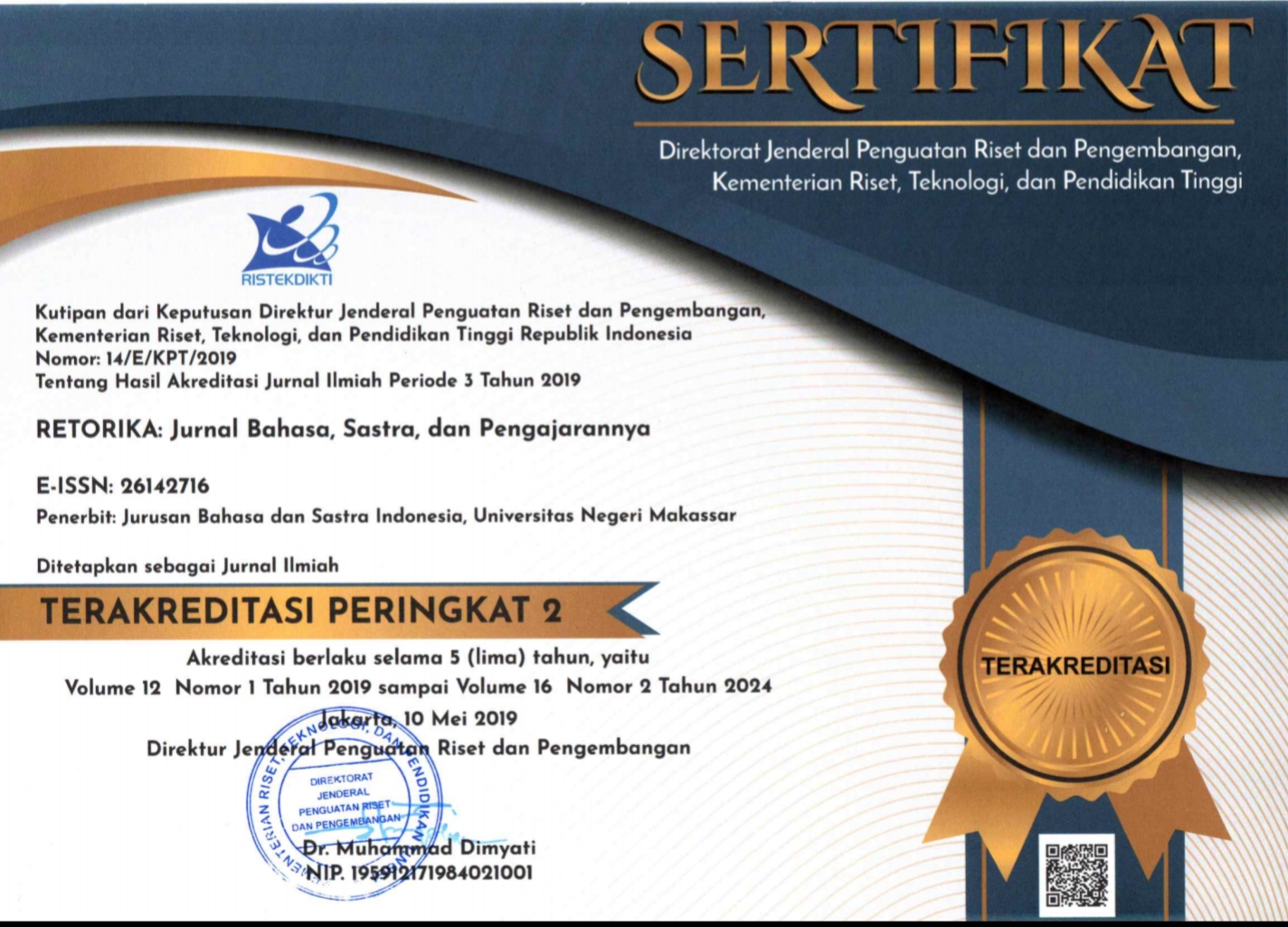THE ACQUISITION OF SWEAR WORDS BY STUDENTS IN CENTRAL KALIMANTAN
(1) Yogyakarta State University
(2) Yogyakarta State University
(*) Corresponding Author
DOI: https://doi.org/10.26858/retorika.v13i2.13803
Abstract
Swear words are often associated to inappropriate expressions in all societies. This study investigates the acquisition of swear words by Indonesian students using social media which was designed in descriptive qualitative approach. Data were gathered by questionnaireand interviews method. Result shows that the students tend to use animal terms to swear to show anger to others. Further, friendship becomes the main source of their acquisition of swear words and these students tend to swear among themselves to show intimacy. Moreover, these students admitted that they learnt how to swear from social media and free videos available on-line.
Keywords
Full Text:
PDFReferences
Amrullah, L. 2016. English Swear Words by Indonesian Learners. JELTL (Journal of English Language Teaching and Linguistics), 1(1), 1-12.
Ayun, P. Q. 2015. Fenomena Remaja Menggunakan Media Sosial dalam Membentuk Identitas. CHANNEL Journal, 3(2), 1-16.
Baudin, N. and Paramasivam. S. 2014. Swearing In English Among A Group Of Female Malaysian Teenagers. International Journal of Contemporary Applied Sciences, 1(3), 14-25
Creswell, J.W. 2009. Research Design: Qualitative, Quantitative, and Mixed Methods Approaches (3rd Ed). New Delhi: Sage Publications.
Dogra, Katpar. 2014. Mahasiswa dan Anjir. Retrieved from https://www.kompasiana.com/katpar/54f7fe11a33311f2608b486f/mahasiswa-dan-anjir. Accessed 21st June, 2020.
Fairman, C. M. (2006). Fuck. Retrieved from http://ssrn.com/abstract=896790. Accessed 21st June, 2020.
Harris, C .L. 2004. Bilingual speakers in the lab: Psychophysiological measures of emotional reactivity. Journal of Multilingual and Multicultural Development, 25(2-3), 223-247.
Hughes, G. 2006. An Encyclopedia of Swearing. New York: M.E.Sharpe.
Jay, T. 2009. The utility and ubiquity of taboo words. Perspectives on Psychological Science, 4(2), 153-161.
KBBI Online. Retrieved from (https://kbbi.kemdikbud.go.id/entri/Tuyul). Accessed 21st June, 2020.
Kristin, J., & Jay, T. 2008. The Pragmatics of Swearing. Journal of Politeness Reasearch 4, 267-288.
Ljung, M. 2011. Swearing: A cross-cultural linguistic study. New York: Palgrave Macmillan.
McEnery, T. 2006. Swearing in English. Bad Language, Purity and Power from 1586 to the Present. New York: Routledge.
Nicolau, M. F. S. and Sukamto, K.E. 2014. Male and Female Attitudes towards Swear Words: A Case Study at Binus International School, Kata Journal, 20 (1), 71-76.
Nicolau, M. F. S. 2016. Swear words among young learners: A case study of the elementary students. Indonesian Journal of English Language Teaching, 11(2), 117-132.
Oliver, F.E. 2011. Swearing and How to Deal with it in the Classroom. Thesis. Faculty of Education. Islandia: University of Iceland.
Soori, A. & Sherafat, Z. 2015. Iranian EFL Learners’ Perception of English Taboo Words. Department of Language and Literature, Larestan Branch Islamic Azad University, Larestan, Iran.
Stenstrom, A.B. 1995.Taboos in teenage talk. In G. Melchers and B. Warren (eds.). Studies in Anglistics (pp. 71-79). Stockholm: Almqvist and Wiksell International.
Stephens, R. 2013. Swearing – the language of life and death. The Psychologist, 26(9), 650- 653.
Triadi, R.B. 2017. Penggunaan Makian Bahasa Indonesia Pada Media Sosial (Kajian Sosiolinguisik). Jurnal Sasindo Unpam, 5(2), 1-26.
Vingerhoets, J.J.M., Bylsma, L.M., & de Vlam, C. 2013. Swearing: A Biopyschosocial Perspective. Department of Medical and Clinical Psychology, Tilburg University, Tilburg – The Netherlands.
Wang, N. 2013. An analysis of the pragmatic functions of “swearing” in interpersonal talk. Griffith Working Papers in Pragmatics and Intercultural Communications, 71-79
Wijana, I Dewa Putu dan Muhammad Rohmadi 2006. Sosiolinguistik: Kajian Teori dan Analisis. Yogyakarta: Pustaka Pelajar.
Wulandari, R.A. 2012. A Sociolinguistics Analysis of Swearing in From Paris with Love Movie. Yogyakarta: English Education Department, Faculty of Languages and Arts, Yogyakarta State University.
Article Metrics
Abstract view : 1007 times | PDF view : 150 timesRefbacks
Copyright (c) 2020 Friyanto Friyanto

This work is licensed under a Creative Commons Attribution-NonCommercial 4.0 International License.
Published by:
Department of Indonesian Language, Faculty of Languages and Literature, Universitas Negeri Makassar in cooperate with Asosiasi Dosen Bahasa dan Sastra Indonesia (ADOBSI) and Ikatan Program Studi Pendidikan Bahasa dan Sastra Indonesia (IKAPROBSI).
Address: Department of Indonesian Language Office, DG Building Second Floor, UNM Parangtambung, Daeng Tata Raya Street, Makassar, South Sulawesi, Indonesia
 Email: retorika@unm.ac.id
Email: retorika@unm.ac.id

RETORIKA: Jurnal Bahasa, Sastra,dan Pengajarannya is licensed under a Creative Commons Attribution-NonCommercial 4.0 International License.
















